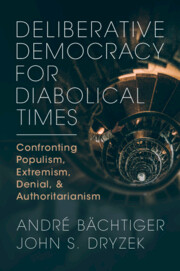 Deliberative Democracy for Diabolical Times
Deliberative Democracy for Diabolical Times Book contents
- Deliberative Democracy for Diabolical Times
- Deliberative Democracy for Diabolical Times
- Copyright page
- Contents
- Preface
- 1 An Introduction for Diabolical Times
- 2 Deliberation for Realists and Skeptics
- 3 Democracy in a Diabolical Soundscape
- 4 How to Deliberate with (and against) Populists
- 5 How to Deliberate with (and against) Extremists
- 6 How to Deliberate with (and against) Deniers
- 7 How to Deliberate with (and against) Authoritarians
- 8 How to Deliberate with Everybody
- 9 How to Renew a Deliberative Democracy
- References
- Index
9 - How to Renew a Deliberative Democracy
Published online by Cambridge University Press: 28 March 2024
- Deliberative Democracy for Diabolical Times
- Deliberative Democracy for Diabolical Times
- Copyright page
- Contents
- Preface
- 1 An Introduction for Diabolical Times
- 2 Deliberation for Realists and Skeptics
- 3 Democracy in a Diabolical Soundscape
- 4 How to Deliberate with (and against) Populists
- 5 How to Deliberate with (and against) Extremists
- 6 How to Deliberate with (and against) Deniers
- 7 How to Deliberate with (and against) Authoritarians
- 8 How to Deliberate with Everybody
- 9 How to Renew a Deliberative Democracy
- References
- Index
Summary
This chapter asks how political systems with deep-rooted democratic pathologies can be rebooted in a more deliberative direction, taking stock of the prospects for democratic repair and renewal in light of our analysis in the preceding chapters. It begins with possible reform of the representative institutions of liberal democratic states, in light of the fact that states with consensus institutions have higher quality public deliberation and stronger defenses against transgressions than do adversarial systems. Next the chapter examines how institutional democratic innovations such as mini-publics can contribute to democratic renewal, before exploring possibilities for more deliberative politicians and parties. Finally we take a citizen-centric view and discuss how a discursive infrastructure combining old and new media with personal networks and political activism can support democratic viability and vitality. A deliberative systems perspective means that no single institution or specific factor will drive democratic renewal, which rather depends on the interplay of the various factors we identify. Since this is not easy to imagine in the abstract, we apply this framework to an unhealthy system – the United States – and healthier ones – Germany and Switzerland. We finish with some take-home lessons for diabolical times.
Keywords
- Type
- Chapter
- Information
- Deliberative Democracy for Diabolical TimesConfronting Populism, Extremism, Denial, and Authoritarianism, pp. 186 - 220Publisher: Cambridge University PressPrint publication year: 2024
